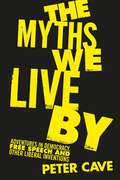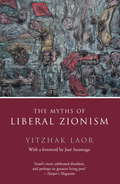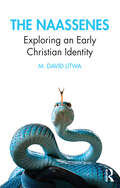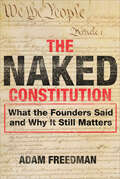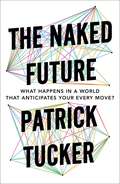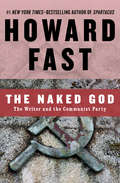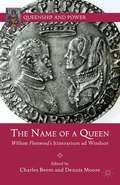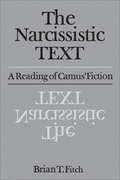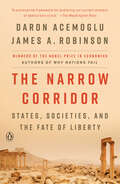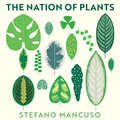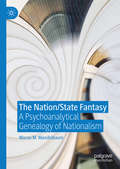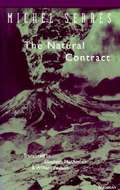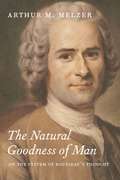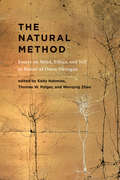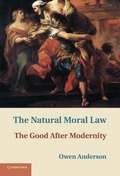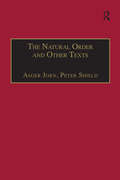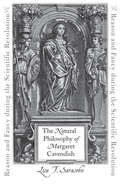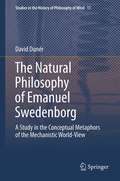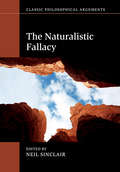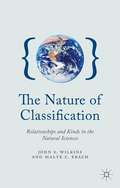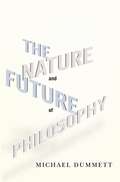- Table View
- List View
The Myths We Live By: A Contrarian's Guide to Democracy, Free Speech and Other Liberal Fictions
by Peter CaveIn this witty and mischievous book, philosopher Peter Cave dissects the most controversial disputes today and uses philosophical argument to reveal that many issues are less straightforward than we'd like to believe. Leaving no sacred cow standing, Cave uses ingenious stories and examples to challenge our most strongly held assumptions. Is democracy inherently a good thing? What is the basis of so-called human rights? Is discrimination always bad? Are we morally obliged to accept refugees? In an age of identity politics and so-called "fake news," this book is an essential resource for reinvigorating genuine public debate —and an entertaining challenge to accepted wisdom.
The Myths of Liberal Zionism
by Yitzhak LaorYitzhak Laor is one of Israel's most prominent dissidents and poets, a latter-day Spinoza who helps keep alive the critical tradition within Jewish culture. In this work he fearlessly dissects the complex attitudes of Western European liberal Left intellectuals toward Israel, Zionism and the "Israeli peace camp." He argues that through a prism of famous writers like Amos Oz, David Grossman and A.B. Yehoshua, the peace camp has now adopted the European vision of "new Zionism," promoting the fierce Israeli desire to be accepted as part of the West and taking advantage of growing Islamophobia across Europe.The backdrop to this uneasy relationship is the ever-present shadow of the Holocaust. Laor is merciless as he strips bare the hypocrisies and unarticulated fantasies that lie beneath the love-affair between "liberal Zionists" and their European supporters.
The Naassenes: Exploring an Early Christian Identity
by M. David LitwaThis volume offers an accessible investigation of the Naassene discourse embedded in the anonymous Refutation of All Heresies (completed about 222 CE), in order to understand the theology and ritual life of the Naassene Christian movement in the late second and early third centuries CE. The work provides basic data on the date, genre, and provenance of the Naassene discourse as summarized by the author of the Refutation (or Refutator). It also offers an analysis of the Refutator’s sources and working methods, an analysis which allows for a full reconstruction of the original Naassene discourse. The book then turns to major aspects of Naassene Christianity: its intense engagement with Hellenic myth and “mysteries,” its biblical sources, its cosmopolitan hermeneutics, its snake symbology, as well as its distinctive approach to baptism, hymns, and celibacy. A concluding chapter outlines all we can securely reconstruct about the Naassene Christian movement in terms of its social identity and place in the larger field of early Christianity and ancient Mediterranean religions more broadly. The Naassenes: Exploring an Early Christian Identity is suitable for students, scholars, and general readers interested in Early Christianity, Gnostic and Nag Hammadi Studies, Classics, and Ancient Philosophy, as well as hermeneutical issues like allegory and intertextuality.
The Naked Constitution: What the Founders Said and Why It Still Matters
by Adam FreedmanIn the spirit of Glenn Beck’s Original Argument comes a lively manifesto on the need to recover the original meaning of the Constitution.From law school classrooms to the halls of Congress, America’s elites have come to regard the Constitution as a mere decorative parchment to be kept under glass at the National Archives. In The Naked Constitution, conservative legal scholar Adam Freedman defends the controversial doctrine of originalism as the only way to restore the Founding Fathers’ vision of American liberty. Freedman argues that the fashionable “Living Constitution” theory has been used by judges and politicians since the Progressive Era of the early 1900s to centralize power in Washington and to threaten individual freedom.The Naked Constitution explains the fundamental themes animating America’s founding charter: limited government, federalism, separation of powers, and individual liberty. Freedman explores the nature of each of the three branches of government as well as the key individual rights enshrined in the Constitution to show how original meaning can help answer the most pressing questions facing America today: Can the president invade another country without the approval of Congress? Can he assassinate or spy on American citizens in the name of fighting terror? Do corporations have the same “free speech” rights as individuals? Can the federal government coerce states to adopt particular policies, or force individuals to buy insurance? Ultimately, Freedman calls for a new constitutional convention that will free the nation from capricious courts and idiosyncratic judges, and limit the growth of government for decades to come.
The Naked Future
by Patrick TuckerIn the past, the future was opaque--the territory of fortune-tellers, gurus, and dubious local TV weathermen. But thanks to recent advances in computing and the reams of data we create through smartphone and Internet use, prediction models for individual behavior grow smarter and more sophisticated by the day. Whom you should marry, whether you'll commit a crime or fall victim to one, if you'll contract a specific strain of flu--even your precise location at any given moment years into the future--are becoming easily accessible facts. the naked future is upon us, and the implications are staggering. Patrick Tucker draws on stories from health care to urban planning to online dating to reveal the shape of a future that's ever more certain. In these pages you'll meet scientists and inventors who can predict your behavior based on your friends' Twitter updates. They are also hacking the New York City sewer system to predict environmental conditions, anticipating how much the weather a year from now will cost an individual farmer, figuring out the time of day you're most likely to slip back into a bad habit, and guessing how well you'll do on a test before you take it. You'll learn how social networks like Facebook are using your data to turn you into an advertisement and why the winning formula for a blockbuster movie is more predictable than ever. The rise of big data and predictive analytics means that governments and corporations are becoming much more effective at accomplishing their goals and at much less cost. Tucker knows that's not always a good thing. But he also shows how we've gained tremendous benefits that we have yet to fully realize. Thanks to the increased power of predictive science, we'll be better able to stay healthy, invest our savings more wisely, learn faster and more efficiently, buy a house in the right neighborhood at the right time, avoid crime, thwart terrorists, and mitigate the consequences of natural disasters. What happens in a future that anticipates your every move? the surprising answer: we'll live better as a result. 'Where I saw a thrilling and historic transformation in the world's oldest idea--the future--other people saw only Target, Facebook, Google, and the government using their data to surveil, track, and trick them . . . But in fact, your data is your best defense against coercive marketing and intrusive government practices. Your data is nothing less than a superpower waiting to be harnessed. ' from the Introduction
The Naked Future
by Patrick Tucker"A thorough yet thoroughly digestible book on the ubiquity of data gathering and the unraveling of personal privacy." --Daniel Pink, author of DriveThanks to recent advances in technology, prediction models for individual behavior grow more sophisticated by the day. Whether you'll marry, commit a crime or fall victim to one, or contract a disease are becoming easily accessible facts. The naked future is upon us, and the implications are staggering.Patrick Tucker draws on fascinating stories from health care to urban planning to online dating. He shows how scientists can predict your behavior based on your friends' Twitter updates, anticipate the weather a year from now, figure out the time of day you're most likely to slip back into a bad habit, and guess how well you'll do on a test before you take it.Tucker knows that the rise of Big Data is not always a good thing. But he also shows how we've gained tremendous benefits that we have yet to fully realize.g. Patrick Tucker draws on stories from health care to urban planning to online dating to reveal the shape of a future that's ever more certain. In these pages you'll meet scientists and inventors who can predict your behavior based on your friends' Twitter updates. They are also hacking the New York City sewer system to predict environmental conditions, anticipating how much the weather a year from now will cost an individual farmer, figuring out the time of day you're most likely to slip back into a bad habit, and guessing how well you'll do on a test before you take it. You'll learn how social networks like Facebook are using your data to turn you into an advertisement and why the winning formula for a blockbuster movie is more predictable than ever. The rise of big data and predictive analytics means that governments and corporations are becoming much more effective at accomplishing their goals and at much less cost. Tucker knows that's not always a good thing. But he also shows how we've gained tremendous benefits that we have yet to fully realize. Thanks to the increased power of predictive science, we'll be better able to stay healthy, invest our savings more wisely, learn faster and more efficiently, buy a house in the right neighborhood at the right time, avoid crime, thwart terrorists, and mitigate the consequences of natural disasters. What happens in a future that anticipates your every move? The surprising answer: we'll live better as a result.
The Naked God: The Writer and the Communist Party
by Howard FastFast&’s book on his break with the Communist Party, and a riveting tribute to the importance of justice and beauty over dogma and rigidityThe Naked God is Howard Fast&’s public repudiation of the Communist Party, of which he was a devoted member for thirteen years until reading about the full scope of atrocities committed by the Soviet Union under Stalin. The bestselling author of Spartacus and Citizen Tom Paine, Howard Fast lent his writing talents and celebrity to the communist cause as a steadfast advocate and public figure. However, he felt increasingly ill at ease with the superior manner Party leaders took with rank-and-file members and with rumors of Soviet anti-Semitism. In his first book after officially leaving the Party in 1956, Howard Fast explores the reasons he joined and his long inner struggle with a political movement in which he never felt he truly belonged. This ebook features an illustrated biography of Howard Fast including rare photos from the author&’s estate.
The Name of a Queen
by Dennis Moore Charles BeemItinerarium ad Windsor concerns a central question of the Elizabethan era: Why should a woman be allowed to rule with the same powers as a king? The man who poses this controversial question within Itinerarium is none other than Queen Elizabeth's powerful favorite Robert Dudley, Earl of Leicester. On hand to provide answers are the statesman and poet Thomas Sackville, Lord Buckhurst, and William Fleetwood antiquary, Recorder of London, and dutiful chronicler of their 1575 conversation. This critical edition of Itinerarium reproduces Fleetwood's text with annotations and a host of interpretive and contextualizing essays from leading scholars. Taken together, they constitute the definitive introduction to this remarkable discussion of regnant queenship, providing a valuable tool for understanding contemporary notions of and underlying fears concerning the efficacy and desirability of female rule in Elizabethan England.
The Narcissistic Text: A Reading of Camus' Fiction
by Brian FitchCritics, theologians, philosophers, and psychoanalysts have written several thousand books, theses, and articles about Camus' fiction. His first published novel, L'Etranger, had a unique impact on a whole generation of readers, and is other fiction, although not as well known, has also been influential. However, Camus' fiction so far has not been judged by contemporary critical methods, and 'inter-textuality,' or the study of the interrelationship between Camus' own texts, has not been examined. The Narcissistic Text: A Reading of Camus' Fiction is the first book devoted to the whole of Camus' fiction to adopt this approach. Brian Fitch uses the critical tools elaborated in the writings of such French formalists as Barthes, Ricardou, and Todorov and draws upon the hermeneutic theory of literature developed by Gadamer and Ricoeur. As a result, the self-generating word-play or linguistic narcissism of 'Jonas' and the textual narcissism of La Peste are seen to give way, in L'Etranger, to a situation where the hermeneutic circle is itself contained within the circularity of autoreprésentation. As for the narcissism of La Chute, it concerns the reader himself, since what the text provides is a model of the hermeneutic process. Fitch thus demonstrates that Camus' fiction occupies a significant place in modern literature. This volume will be of particular interest to those involved in Camus studies or concerned with contemporary critical methodology and literary theory.
The Narrow Corridor: States, Societies, and the Fate of Liberty
by Daron Acemoglu James A. RobinsonFrom the authors of the international bestseller Why Nations Fail, a crucial new big-picture framework that answers the question of how liberty flourishes in some states but falls to authoritarianism or anarchy in others--and explains how it can continue to thrive despite new threats. In Why Nations Fail, Daron Acemoglu and James A. Robinson argued that countries rise and fall based not on culture, geography, or chance, but on the power of their institutions. In their new book, they build a new theory about liberty and how to achieve it, drawing a wealth of evidence from both current affairs and disparate threads of world history. Liberty is hardly the "natural" order of things. In most places and at most times, the strong have dominated the weak and human freedom has been quashed by force or by customs and norms. Either states have been too weak to protect individuals from these threats, or states have been too strong for people to protect themselves from despotism. Liberty emerges only when a delicate and precarious balance is struck between state and society. There is a Western myth that political liberty is a durable construct, arrived at by a process of "enlightenment." This static view is a fantasy, the authors argue. In reality, the corridor to liberty is narrow and stays open only via a fundamental and incessant struggle between state and society: The authors look to the American Civil Rights Movement, Europe’s early and recent history, the Zapotec civilization circa 500 BCE, and Lagos’s efforts to uproot corruption and institute government accountability to illustrate what it takes to get and stay in the corridor. But they also examine Chinese imperial history, colonialism in the Pacific, India’s caste system, Saudi Arabia’s suffocating cage of norms, and the “Paper Leviathan” of many Latin American and African nations to show how countries can drift away from it, and explain the feedback loops that make liberty harder to achieve. Today we are in the midst of a time of wrenching destabilization. We need liberty more than ever, and yet the corridor to liberty is becoming narrower and more treacherous. The danger on the horizon is not "just" the loss of our political freedom, however grim that is in itself; it is also the disintegration of the prosperity and safety that critically depend on liberty. The opposite of the corridor of liberty is the road to ruin.
The Nation of Plants: The International Bestseller
by Stefano MancusoAs plants see it, humans are not the masters of the Earth but only one of its most unpleasant and irksome residents. They have been on the planet for only about 300,000 years ago (nothing compared to the three billon years of plant evolution), yet have changed the conditions of the planet so drastically as to make it a dangerous place for their own survival. It's time for the plants to offer advice.In this playful, philosophical manifesto, Stefano Mancuso, expert on plant intelligence, presents a new constitution on which to build our future as beings respectful of the Earth and its inhabitants. These eight articles - the fundamental pillars on which plant life is based - must henceforth regulate all living beings.
The Nation/State Fantasy: A Psychoanalytical Genealogy of Nationalism (Palgrave Studies In International Relations Ser.)
by Moran M. MandelbaumThis book explores the origins of nationalism and the ideal of nation/state congruency since early-modern European thought, their transformation over time and endurance in contemporary political thought and IR theory. The author deploys a Lacanian-psychoanalytical reading of nationalism and the nation/state that goes beyond methodological nationalism and state-centrism critiques. He offers a genealogical inquiry into the emergence of the nation/state congruency ideal, thus exposing and problematising the practices that render nationalism and the ideal of the nation/state necessary. Offering a new way to read the ontology and epistemology of the nation/state, this work will be of interest to students and scholars of nations and nationalism, political thought, critical international relations and critical security studies.
The Natural City
by Ingrid Leman Stefanovic Stephen Bede ScharperUrban and natural environments are often viewed as entirely separate entities - human settlements as the domain of architects and planners, and natural areas as untouched wilderness. This dichotomy continues to drive decision-making in subtle ways, but with the mounting pressures of global climate change and declining biodiversity, it is no longer viable. New technologies are promising to provide renewable energy sources and greener designs, but real change will require a deeper shift in values, attitudes, and perceptions. A timely and important collection, The Natural City explores how to integrate the natural environment into healthy urban centres from philosophical, religious, socio-political, and planning perspectives. Recognizing the need to better link the humanities with public policy, The Natural City offers unique insights for the development of an alternative vision of urban life.
The Natural Contract (Studies in Literature and Science)
by Michel Serres Elizabeth MacArthur William PaulsonGlobal environmental change, argues Michel Serres, has forced us to reconsider our relationship to nature. In this translation of his influential 1990 book Le Contrat Naturel, Serres calls for a natural contract to be negotiated between Earth and its inhabitants. World history is often referred to as the story of human conflict. Those struggles that are seen as our history must now include the uncontrolled violence that humanity perpetrates upon the earth, and the uncontrollable menace to human life posed by the earth in reaction to this violence. Just as a social contract once brought order to human relations, Serres believes that we must now sign a "natural contract" with the earth to bring balance and reciprocity to our relations with the planet that gives us life. Our survival depends on the extent to which humans join together and act globally, on an earth now conceived as an entity. Tracing the ancient beginnings of modernity, Serres examines the origins and possibilities of a natural contract through an extended meditation on the contractual foundations of law and science. By invoking a nonhuman, physical world, Serres asserts, science frees us from the oppressive confines of a purely social existence, but threatens to become a totalitarian order in its own right. The new legislator of the natural contract must bring science and law into balance. Serres ends his meditation by retelling the story of the natural contract as a series of parables. He sees humanity as a spacecraft that with the help of science and technology has cast off from familiar moorings. In place of the ties that modernity and analytic reason have severed, we find a network of relations both stranger and stronger than any we once knew, binding us to one another and to the world. The philosopher's harrowing and joyous task, Serres tells us, is that of comprehending and experiencing the bonds of violence and love that unite us in our spacewalk to the spaceship Mother Earth.
The Natural Goodness of Man: On the System of Rousseau's Thought
by Arthur M. MelzerThe true key to all the perplexities of the human condition, Rousseau boldly claims, is the “natural goodness of man.” It is also the key to his own notoriously contradictory writings, which, he insists, are actually the disassembled parts of a rigorous philosophical system rooted in that fundamental principle. What if this problematic claim—so often repeated, but as often dismissed—were resolutely followed and explored? Arthur M. Melzer adopts this approach in The Natural Goodness of Man. The first two parts of the book restore the original, revolutionary significance of this now time-worn principle and examine the arguments Rousseau offers in proof of it. The final section unfolds and explains Rousseau’s programmatic thought, especially the Social Contract, as a precise solution to the human problem as redefined by the principle of natural goodness. The result is a systematic reconstruction of Rousseau’s philosophy that discloses with unparalleled clarity both the complex weave of his argument and the majestic unity of his vision. Melzer persuasively resolves one after another of the famous Rousseauian paradoxes–enlarging, in the process, our understanding of modern philosophy and politics. Engagingly and lucidly written, The Natural Goodness of Man will be of interest to general as well as scholarly readers.
The Natural Method: Essays on Mind, Ethics, and Self in Honor of Owen Flanagan
by Eddy Nahmias, Thomas W. Polger, and Wenqing ZhaoProminent philosophers explore themes in the work of Owen Flanagan, focusing on debates about the nature of mind, the self, and morality.Owen Flanagan's work offers a model for how to be a naturalistic and scientifically informed philosopher who writes beautifully and deeply about topics as varied as consciousness and Buddhism, moral psychology and dreaming, identity and addiction, literature and neuroscience. In this volume, leading philosophers--Flanagan's friends, colleagues, and former students--explore themes in his work, focusing on debates over the nature of mind, the self, and morality. Some contributors address Flanagan's work directly; others are inspired by his work or methodology. Their essays are variously penetrating and synoptic, cautious and speculative.
The Natural Moral Law
by Owen AndersonThe Natural Moral Law argues that the good can be known and that therefore the moral law, which serves as a basis for human choice, can be understood. Proceeding historically through ancient, modern, and postmodern thinkers, Owen Anderson studies beliefs about the good and how it is known, and how such beliefs shape claims about the moral law. The focal challenge is whether the skepticism of postmodern thinkers can be answered in a way that preserves knowledge claims about the good. Considering the failures of modern thinkers to correctly articulate reason and the good and how postmodern thinkers are responding to these failures, Anderson argues that there are identifiable patterns of thinking about what is good, some of which lead to false dichotomies. The book concludes with a consideration of how a moral law might look if the good is correctly identified.
The Natural Order and Other Texts
by Asger Jorn Peter ShieldIn The Natural Order and Other Texts, Peter Shield presents the first English translations of the artist Asger Jorn's three philosophical texts - The Natural Order, Value and Economy and Luck and Chance. Offering a unique insight into an artist's attempt to make sense of a contemporary world which would accommodate his practice, these texts present an important contribution to aesthetics for modern art and an attempt at philosophical reconciliation of modern science and modern art. In 1961 Jorn resigned from the Situationist International and took the ideas of thinkers in many fields and amalgamated them into 'the first complete revision of the existing philosophical system' from the point of view of an artist. He developed a theory of artistic value and the place of the creative elite and adapted his previous ideas of extreme aesthetics to fit into this 'natural order'. Including a comprehensive introduction, Peter Shield's translations of Asger Jorn's classic texts offer invaluable new perspectives to readers crossing the boundaries of philosophy, art history and theory, and cultural studies. Peter Shield is an art historian, whose book Comparative Vandalism on these and other works by Jorn is also published by Ashgate.
The Natural Philosophy of Margaret Cavendish: Reason and Fancy during the Scientific Revolution (The Johns Hopkins University Studies in Historical and Political Science #128)
by Lisa T. SarasohnHonorable Mention, Typographic Covers, Large Nonprofit Publishers, 2010 Washington Book Publishers ShowMargaret Cavendish, Duchess of Newcastle, led a remarkable—and controversial—life, writing poetry and prose and philosophizing on the natural world at a time when women were denied any means of a formal education. Lisa T. Sarasohn acutely examines the brilliant work of this untrained mind and explores the unorthodox development of her natural philosophy. Cavendish wrote copiously on such wide-ranging topics as gender, power, manners, scientific method, and animal rationality. The first woman to publish her own natural philosophy, Cavendish was not afraid to challenge the new science and even ridiculed the mission of the Royal Society. Her philosophy reflected popular culture and engaged with the most radical philosophies of her age. To understand Cavendish’s scientific thought, Sarasohn explains, is to understand the reception of new knowledge through both insider and outsider perspectives in early modern England. In close readings of Cavendish’s writings—poetry, treatises, stories, plays, romances, and letters—Sarasohn explores the fantastic and gendered elements of her natural philosophy. Cavendish saw knowledge as a continuum between reason and fancy, and her work integrated imaginative speculation and physical science. Because she was denied the university education available to her male counterparts, she embraced an epistemology that favored contemplation and intuition over logic and empiricism. The Natural Philosophy of Margaret Cavendish serves as a guide to the unusual and complex philosophy of one of the seventeenth century’s most intriguing minds. It not only celebrates Cavendish as a true figure of the scientific age but also contributes to a broader understanding of the contested nature of the scientific revolution.
The Natural philosophy of Emanuel Swedenborg
by David DunérAlthough Emanuel Swedenborg (1688-1772) is commonly known for his spiritual philosophy, his early career was focused unnatural science. During this period, Swedenborg thought of the world was like a gigantic machine, following the laws of mechanics and geometry. This volume analyzes this mechanistic worldview from the cognitive perspective, by means of a study of the metaphors in Swedenborg's texts. The author argues that these conceptual metaphors are vital skills of the creative mind and scientific thinking, used to create visual analogies and abstract ideas. This means that Swedenborg's mechanistic and geometrical worldview, allowed him to perceive the world as mechanical and geometrical. Swedenborg thought "with" books and pens. The reading gave him associations and clues, forced him to interpret, and gave him material for his intellectual development.
The Natural philosophy of Emanuel Swedenborg: A Study in the Conceptual Metaphors of the Mechanistic World-View (Studies in the History of Philosophy of Mind #11)
by David DunerAlthough Emanuel Swedenborg (1688–1772) is commonly known for his spiritual philosophy, his early career was focused unnatural science. During this period, Swedenborg thought of the world was like a gigantic machine, following the laws of mechanics and geometry. This volume analyzes this mechanistic worldview from the cognitive perspective, by means of a study of the metaphors in Swedenborg’s texts. The author argues that these conceptual metaphors are vital skills of the creative mind and scientific thinking, used to create visual analogies and abstract ideas. This means that Swedenborg’s mechanistic and geometrical worldview, allowed him to perceive the world as mechanical and geometrical. Swedenborg thought ”with” books and pens. The reading gave him associations and clues, forced him to interpret, and gave him material for his intellectual development.
The Naturalistic Fallacy (Classic Philosophical Arguments)
by Neil SinclairAt the turn of the twentieth century, G. E. Moore contemptuously dismissed most previous 'ethical systems' for committing the 'Naturalistic Fallacy'. This fallacy - which has been variously understood, but has almost always been seen as something to avoid - was perhaps the greatest structuring force on subsequent ethical theorising. To a large extent, to understand the Fallacy is to understand contemporary ethics. This volume aims to provide that understanding. Its thematic chapters - written by a range of distinguished contributors - introduce the history, text and philosophy behind Moore's charge of fallacy and its supporting 'open question' argument. They detail how the fallacy influenced multiple traditions in ethics (including evolutionary, religious and naturalistic approaches), its connections to supposed dichotomies between 'is'/'ought' and facts/values, and its continuing relevance to our understanding of normativity. Together, the chapters provide a historical and opinionated introduction to contemporary ethics that will be essential for students, teachers and researchers.
The Nature Of Classification
by Malte C. Ebach John S. WilkinsDiscussing the generally ignored issue of the classification of natural objects in the philosophy of science, this book focuses on knowledge and social relations, and offers a way to understand classification as a necessary aspect of doing science.
The Nature and Future of Philosophy
by Michael DummettPhilosophy is a discipline that makes no observations, conducts no experiments, and needs no input from experience. It is an armchair subject, requiring only thought. Yet that thought can advance knowledge in unexpected directions, not only through the discovery of new facts but also through the enhancement of what we already know. Philosophy can clarify our vision of the world and provide exciting ways to interpret it. Of course, philosophy's unified purpose hasn't kept the discipline from splintering into warring camps. Departments all over the world are divided among analytical and continental schools, Heidegger, Hegel, and other major thinkers, challenging the growth of the discipline and obscuring its relevance and intent. Having spent decades teaching in American, Asian, African, and European universities, Michael Dummett has felt firsthand the fractured state of contemporary practice and the urgent need for reconciliation. Setting forth a proposal for renewal and reengagement, Dummett begins with the nature of philosophical inquiry as it has developed for centuries, especially its exceptional openness and perspective-which has, ironically, led to our present crisis. He discusses philosophy in relation to science, religion, morality, language, and meaning and recommends avenues for healing around a renewed investigation of mind, language, and thought. Employing his trademark frankness and accessibility, Dummett asks philosophers to resolve theoretical difference and reclaim the vital work of their practice.
The Nature and Future of Philosophy (Columbia Themes in Philosophy)
by Michael DummettPhilosophy is a discipline that makes no observations, conducts no experiments, and needs no input from experience. It is an armchair subject, requiring only thought. Yet that thought can advance knowledge in unexpected directions, not only through the discovery of new facts but also through the enhancement of what we already know. Philosophy can clarify our vision of the world and provide exciting ways to interpret it.Of course, philosophy's unified purpose hasn't kept the discipline from splintering into warring camps. Departments all over the world are divided among analytical and continental schools, Heidegger, Hegel, and other major thinkers, challenging the growth of the discipline and obscuring its relevance and intent. Having spent decades teaching in American, Asian, African, and European universities, Michael Dummett has felt firsthand the fractured state of contemporary practice and the urgent need for reconciliation. Setting forth a proposal for renewal and reengagement, Dummett begins with the nature of philosophical inquiry as it has developed for centuries, especially its exceptional openness and perspective-which has, ironically, led to our present crisis. He discusses philosophy in relation to science, religion, morality, language, and meaning and recommends avenues for healing around a renewed investigation of mind, language, and thought. Employing his trademark frankness and accessibility, Dummett asks philosophers to resolve theoretical difference and reclaim the vital work of their practice.
